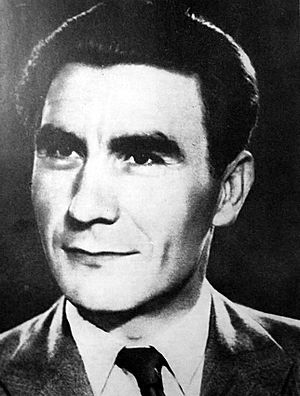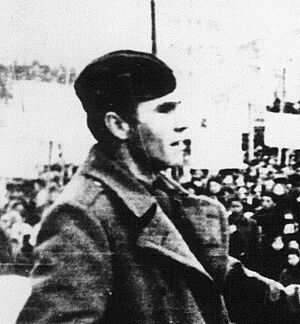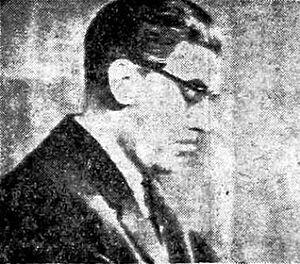Lazar Koliševski facts for kids
Quick facts for kids
Lazar Koliševski
Лазар Колишевски |
|
|---|---|

Koliševski during the 1940's
|
|
| 1st President of the Presidency of Yugoslavia | |
| In office 4 May 1980 – 15 May 1980 |
|
| Prime Minister | Veselin Đuranović |
| Preceded by | Josip Broz Tito |
| Succeeded by | Cvijetin Mijatović |
| 6th President of the People's Assembly of PR Macedonia | |
| In office 19 December 1953 – 26 June 1962 |
|
| Prime Minister | Ljupčo Arsov Aleksandar Grlickov |
| Preceded by | Dimce Stojanov |
| Succeeded by | Ljupčo Arsov |
| 1st President of the Executive Council of PR Macedonia | |
| In office 16 April 1945 – 19 December 1953 |
|
| President | Metodija Andonov - Čento Dimitar Vlahov |
| Preceded by | Office established |
| Succeeded by | Ljupčo Arsov |
| 1st Secretary of the League of Communists of Macedonia | |
| In office 1945 – July 1963 |
|
| Preceded by | Office established |
| Succeeded by | Krste Crvenkovski |
| Personal details | |
| Born | 12 February 1914 Sveti Nikole, Kingdom of Serbia |
| Died | 6 July 2000 (aged 86) Skopje, Macedonia |
| Nationality | Yugoslav/Macedonian |
| Political party | SKJ |
| Awards | Order of the National Hero of Yugoslavia |
| Military service | |
| Allegiance | SFR Yugoslavia |
| Branch/service | Ground Forces (KoV) |
| Years of service | 1941–1980 |
| Rank | Major General |
| Commands | Yugoslav Partisans Yugoslav People's Army |
| Battles/wars | World War II |
Lazar Koliševski (Macedonian: Лазар Колишевски 12 February 1914 – 6 July 2000) was an important political leader in Yugoslavia and the Socialist Republic of Macedonia. He was a member of the Communist Party and worked closely with Josip Broz Tito, who was the leader of Yugoslavia for a long time. Koliševski played a big role in shaping Macedonia after World War II.
Contents
Early Life and Political Beginnings
Koliševski was born in 1914 in Sveti Nikole, which was then part of the Kingdom of Serbia. His family were poor farmers. When he was very young, during World War I, both of his parents died. This made him an orphan.
After the war, he was cared for by his aunts in Bitola. He later moved to a state orphanage where he finished his primary school. He then went to a technical school in Kragujevac. It was there that Lazar became interested in politics and learned about communism, a political idea about shared ownership and equality. Because of his political activities, he was arrested and lost his job at a factory. In the 1930s, he became an important activist in the Yugoslav Communist Party.
Role in World War II

When Nazi forces entered Belgrade in April 1941, parts of Vardar Macedonia were taken over by Bulgaria, which was an ally of Germany. Other parts went to Italy. Lazar Koliševski became the Secretary of the Communist Committee in Macedonia in late 1941. He worked to organize groups to fight against the Bulgarian authorities.
He was arrested by a Bulgarian military court and sentenced to death. However, he wrote letters asking for his life to be spared, and his sentence was changed to life in prison. He was sent to a prison in Bulgaria.
In September 1944, Koliševski was set free by the new pro-communist government in Bulgaria. He quickly became the leader of the League of Communists of Macedonia, which was part of the Communist Party of Yugoslavia. As the war ended, Koliševski became the Prime Minister of the Federal State of Macedonia. This was the highest position in Macedonia at that time. For his efforts during the war, he was given the "People's Hero of Yugoslavia" medal.
Leadership in Yugoslavia
After World War II, Koliševski became a very powerful person in Macedonia and one of the most powerful in all of Yugoslavia. He worked to strengthen a unique ethnic Macedonian identity and language. He also took strong actions to make sure Macedonia stayed closely connected to Yugoslavia.
Koliševski started major economic and social changes. He helped bring the Industrial Revolution to Macedonia. By 1955, the capital city, Skopje, was growing very fast. Thanks to his changes, Macedonia, which had been the poorest area of Yugoslavia in 1945, became one of the fastest-growing economies.
In 1953, Koliševski stepped down as Prime Minister of Macedonia. He then became the President of the People's Assembly, which made him the head of state for Macedonia. He still remained the Chairman of the League of Communists of Macedonia, which meant he was still very influential.
He also started traveling to other countries as a diplomat for Yugoslavia. He visited nations like Egypt, India, and Indonesia in the late 1950s and early 1960s. These countries later formed the Non-Aligned Movement, a group of states that did not formally align with or against any major power bloc during the Cold War. These trips showed that Josip Broz Tito, the leader of Yugoslavia, trusted Koliševski a lot.
After a new Yugoslav Constitution was passed in 1974, Koliševski became even more important in Yugoslav politics. He was chosen to be the Macedonian representative to the Yugoslav Presidency. On May 15, 1979, he was voted to become the President of the Presidency and Vice President of Yugoslavia.
When Tito became ill on New Year's Day in 1980, Koliševski took over as the acting leader. Tito passed away five months later, on May 4, 1980. Koliševski continued as the acting head of the presidency for another ten days before the role passed to Cvijetin Mijatović.
Later Years in Macedonia
After Yugoslavia broke apart, Koliševski lived in Skopje, the capital of the newly independent Republic of Macedonia. He passed away on July 6, 2000. In 2002, a monument was built in his honor in his hometown.
Images for kids
See also
 In Spanish: Lazar Koliševski para niños
In Spanish: Lazar Koliševski para niños
 | Stephanie Wilson |
 | Charles Bolden |
 | Ronald McNair |
 | Frederick D. Gregory |



